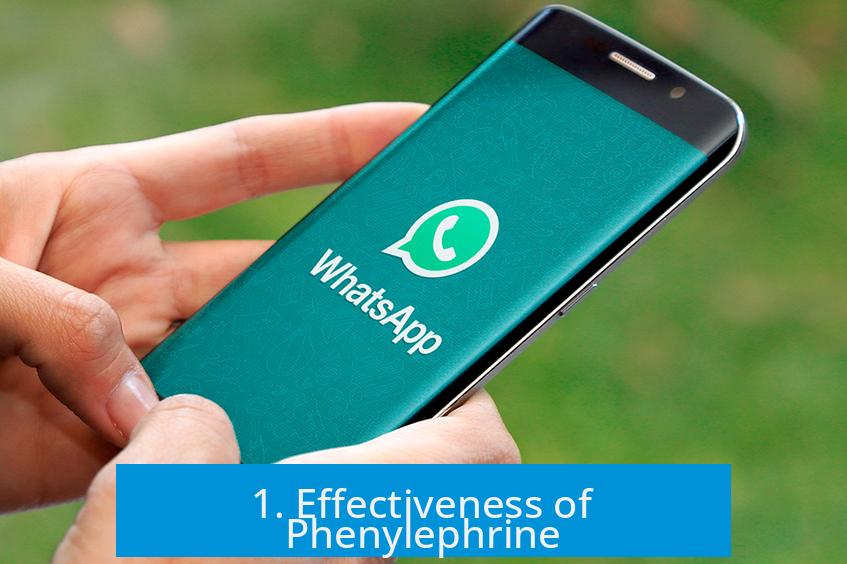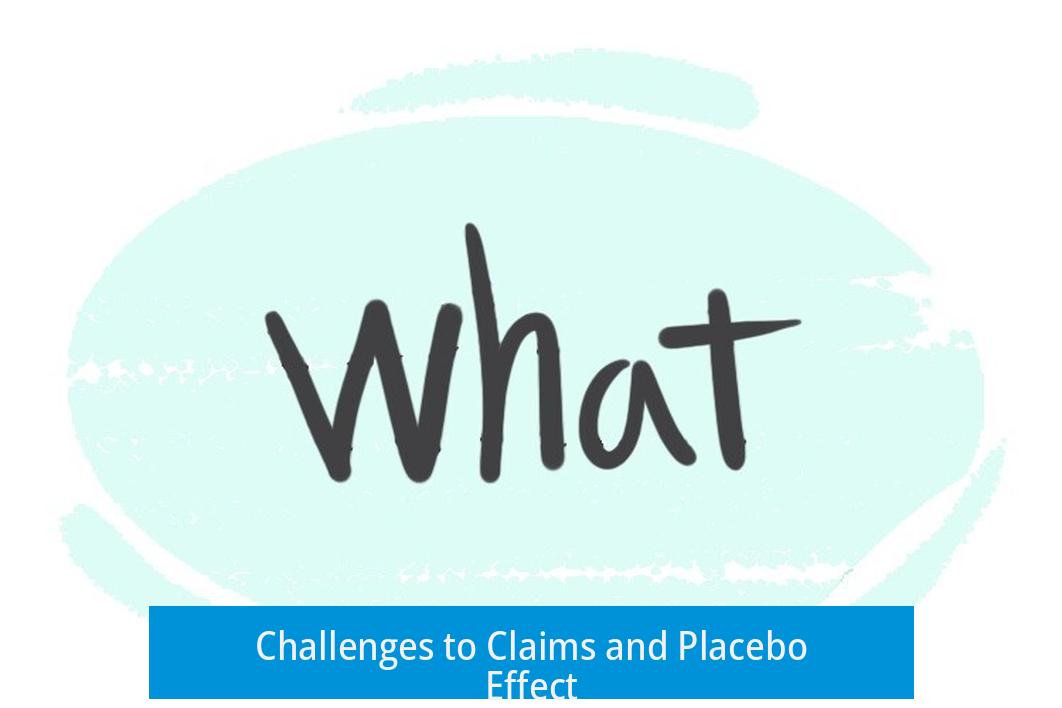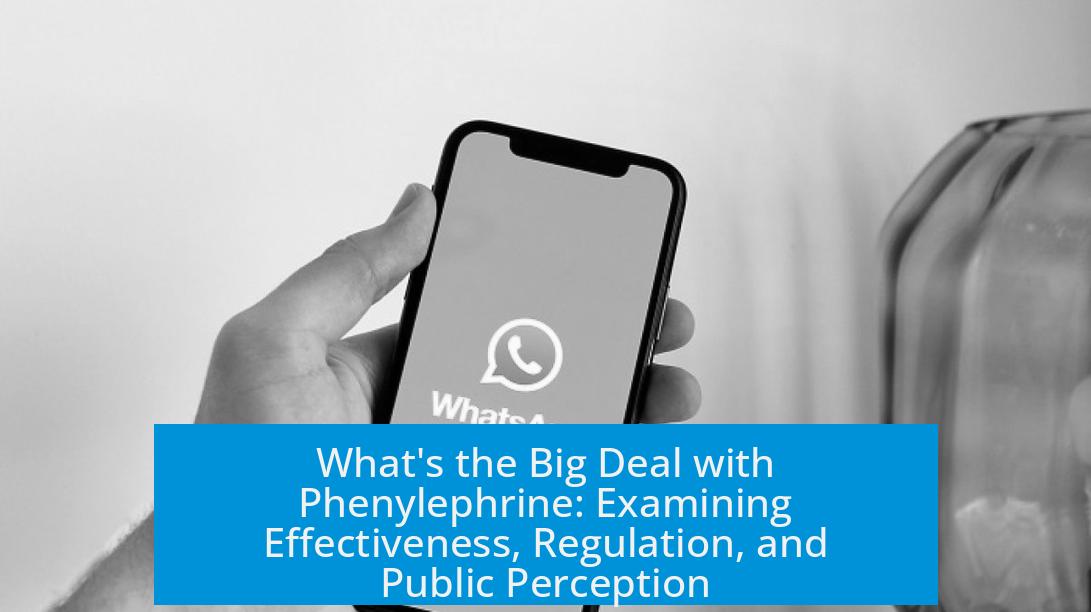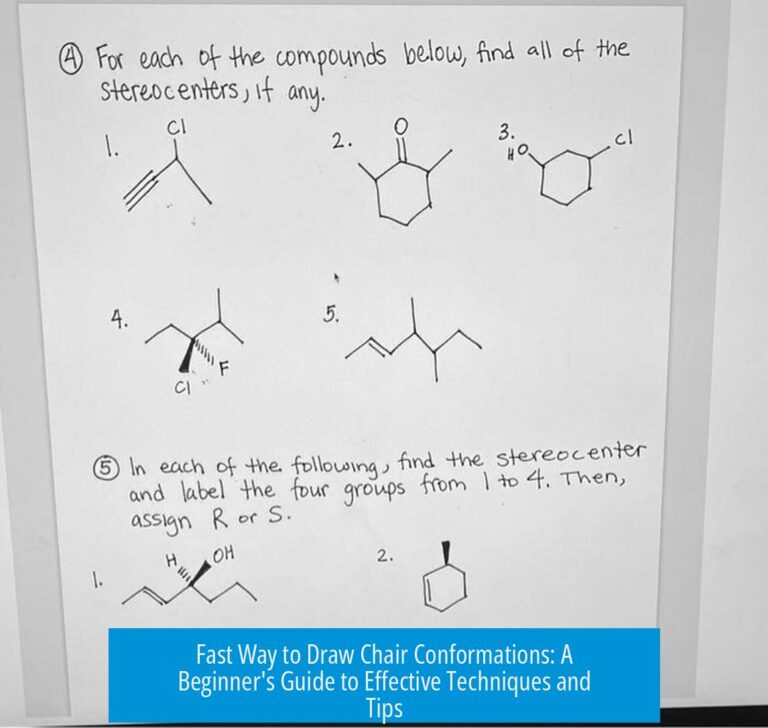What’s the Big Deal with Phenylephrine?
Phenylephrine is commonly marketed as an over-the-counter nasal decongestant, but its effectiveness has been heavily questioned. The FDA has concluded that phenylephrine offers no better relief than a placebo. Despite this, it remains widely available, creating confusion and concern among consumers and healthcare professionals alike.
1. Effectiveness of Phenylephrine

Phenylephrine: No Better Than Placebo
Multiple studies and reviews over years have suggested that phenylephrine, when taken orally, does not outperform placebo in relieving nasal congestion. This conclusion stands in contrast to long-held consumer beliefs and healthcare practitioner assumptions.
The FDA’s official position, affirmed in recent years, states there is insufficient evidence to confirm phenylephrine’s effectiveness at recommended oral doses for nasal congestion relief. This regulatory stance has not been widely publicized, leading to a gap in awareness among both consumers and some healthcare providers.
Mixed Personal Experiences
- Some individuals report phenylephrine works effectively for them personally, particularly nasal spray formulations.
- Others find no benefit, aligning with scientific reviews.
- The 1% nasal spray form can provide quicker relief than oral forms, often matching effects similar to pseudoephedrine for some users.
Therefore, while scientific consensus trends toward ineffectiveness orally, individual experiences vary, particularly with topical application.
Challenges to Claims and Placebo Effect

The notion that phenylephrine’s benefits derive from placebo responses gains traction as studies demonstrate minimal physiological impact at oral doses. Patients who report relief may experience psychological effects or natural symptom fluctuation rather than drug action.
This discrepancy leads to debates among consumers and professionals about real versus perceived benefits, with some defending phenylephrine on anecdotal grounds.
2. FDA and Regulatory Issues
Regulatory Loopholes and Industry Practices
Pharmaceutical companies capitalized on regulatory gaps allowing phenylephrine to reach the market without rigorous proof of effectiveness. Unlike pseudoephedrine, phenylephrine was not subjected to the same pre-market scrutiny.
The FDA’s more recent scrutiny might remove its Generally Recognized as Safe and Effective (GRASE) status, possibly restricting phenylephrine’s labeling and marketing as a nasal decongestant.
Legal But Misleading

Phenylephrine’s continued sales reflect not safety concerns but potential consumer fraud executed legally. Consumers may unknowingly purchase ineffective medications due to misleading claims supported by manufacturers.
Pharmacists and medical providers sometimes remain unaware of these regulatory updates, limiting their ability to inform patients accurately.
Consumer Awareness and Misinformation
- Public knowledge has not kept pace with scientific and regulatory revelations.
- Reports questioning phenylephrine’s efficacy have circulated for years, yet many consumers and healthcare workers remain uninformed.
- This lag leads to surprises when patients learn about the drug’s questionable performance.
3. Comparison to Pseudoephedrine
Pseudoephedrine: Proven Efficacy

Pseudoephedrine is a well-established nasal decongestant with proven efficacy supported by substantial scientific evidence. It acts directly on adrenergic receptors to constrict nasal blood vessels and reduce swelling.
Its effectiveness contrasts starkly with phenylephrine’s questionable benefits.
Phenylephrine as a Substitute: An Inferior Option
Phenylephrine was introduced largely as a pseudoephedrine substitute due to stricter regulatory controls on pseudoephedrine sales imposed to prevent methamphetamine production.
However, phenylephrine does not match pseudoephedrine’s potency or consistency in relieving nasal congestion.
Challenges in Pseudoephedrine Regulation and Abuse
- Pseudoephedrine’s restriction aims to curb illegal methamphetamine synthesis.
- These controls elevate pseudoephedrine’s cost and reduce accessibility for legitimate users.
- Countries with tight pseudoephedrine regulations sometimes face unintended consequences, including methamphetamine epidemics fueled by illicit imports.
Alternative Molecules Suggested

Some experts propose safer analogues like N-methyl pseudoephedrine or N-methyl ephedrine as effective decongestants with lower abuse potential. For example, N-methyl ephedrine is available over-the-counter in Japan’s cold remedies.
Such options could balance efficacy and regulatory safety.
4. Public Perception and Awareness
Consumer Surprise and Skepticism
Many consumers express surprise or doubt upon discovering phenylephrine’s limited or no clinical effectiveness, especially after years of trusting the product.
This gap challenges the public’s trust in pharmaceutical marketing and regulatory processes.
Slow Awareness Among Older Generations and Healthcare Providers
Older adults and some health professionals have yet to fully absorb or accept the data discrediting phenylephrine.
Surveys and anecdotal reports indicate pharmacists and doctors might be unaware of the revised FDA stance even in 2024.
Concerns Over Access to Effective Remedies
Regions that do not allow easy pseudoephedrine access face difficulties providing effective congestion relief. This situation prompts calls for better alternatives or regulatory revisions to avoid reliance on ineffective medications.
5. Alternative Uses of Phenylephrine
Phenylephrine in Hemorrhoid Creams
While oral phenylephrine fails as a decongestant, topical formulations prove clinically useful. Phenylephrine creams reduce swelling in hemorrhoidal tissue by constricting blood vessels locally.
This application leverages its vaso-constrictive properties effectively and safely.
6. Related Issues in Drug Control and Policy
Methamphetamine Production and Pseudoephedrine Control
Illicit methamphetamine manufacture primarily occurs industrially outside households, not from “garage cooks” using small amounts of pseudoephedrine.
Strict control of pseudoephedrine aims to disrupt this supply but can unintentionally empower organized crime due to high prices and demand.
Street Sales and Pharmaceutical Misuse
Concerns exist that harder access to effective medications may lead consumers to unauthorized street sources for cough and cold medicines.
Such underground markets present safety and regulatory challenges.
Additional Regulatory Stringency
Some local policies exemplify increasing regulation trends, for instance, age restrictions on seemingly unrelated items like helium balloons, reflecting complex public health or safety approaches.
Summary of Key Takeaways
- Phenylephrine’s oral formulation lacks proven effectiveness for relieving nasal congestion according to FDA and scientific reviews.
- Pharmacists and consumers often remain unaware of this information, leading to continued use and marketing of phenylephrine-based products.
- Pseudoephedrine remains the gold standard for nasal decongestants but faces regulatory restrictions due to abuse potential.
- Phenylephrine shows efficacy in topical forms, such as hemorrhoid creams, but fails as an oral decongestant.
- Calls persist for safer, effective alternatives to pseudoephedrine that can bypass abuse-related restrictions.
- Drug control policies can have unintended consequences, including public misunderstanding and illicit market growth.
What’s the Big Deal with Phenylephrine?
Phenylephrine, the common over-the-counter decongestant, is stirring quite the controversy, mostly because it’s no better than a placebo. This isn’t gossip; the FDA itself confirmed this recently. Surprised? You’re not alone. Many consumers, pharmacists, and even some doctors are still unaware of this FDA conclusion, which, quite frankly, is almost a year old by mid-2024. So, what gives? Why is phenylephrine still everywhere, and why do some folks swear by it? Let’s unpack this mystery.
Phenylephrine has long been the “go-to” replacement for pseudoephedrine, especially when regulations nudged the latter behind the pharmacy counter. But unlike pseudoephedrine, which works well by constricting blood vessels in nasal passages to reduce congestion, phenylephrine’s effectiveness is hotly debated. Scientific studies and meta-analyses consistently show phenylephrine performs no better than a sugar pill.
The FDA’s Quiet Revelation and Its Impact
Here’s a kicker: while pharmaceutical companies never had to prove phenylephrine’s effectiveness to the FDA, the agency’s recent assessment declared it ineffective for relieving nasal congestion. Many pharmacists and doctors haven’t even heard of this update. For instance, as of September 2024, one pharmacist at Walgreens was shocked—imagine working with meds and missing this critical development!
This lack of awareness baffles many, especially since phenylephrine hasn’t posed safety issues—it simply doesn’t deliver on its promises. This is not about dangerous side effects but about consumer trust and honest advertising. Pharmaceutical firms exploited regulatory loopholes, cashing in on a product that sells well, despite lacking real clinical proof.
Why Do Some People Swear Phenylephrine Works?
This is where things get interesting. While large-scale studies label phenylephrine ineffective, some individuals report feeling relief. For example, people who can’t tolerate pseudoephedrine’s stimulant effects—like increased heart rate—might find phenylephrine a milder, workable alternative. One patient shared that the 1% nasal spray version works “just as well as Sudafed and faster.”
Are these experiences just placebo effects? Perhaps. But can you really underestimate the power of placebo? One person joked: “If placebo clears airways for me, psychology professors should teach people to will away congestion.” This highlights a fascinating aspect: the subjective nature of symptom relief. Even ineffective meds might offer comfort, which challenges how we measure “effectiveness.”
The Phenylephrine vs. Pseudoephedrine Showdown
Pseudoephedrine remains the heavyweight champion of nasal decongestants. It’s genuinely effective, but its availability is limited—thanks to its use in methamphetamine production. Tightened controls mean it’s harder to get over the counter in many regions, pushing consumers toward phenylephrine products.
Unfortunately, phenylephrine doesn’t hold a candle to pseudoephedrine’s congestion-busting power. That leaves a gap for people wanting relief without potential abuse issues. Some experts suggest safe alternatives, like N-methyl pseudoephedrine or N-methyl ephedrine, already used in Japanese OTC meds. Sounds like a promising middle ground, though no major markets have yet adopted these widely.
Internationally, cracking down on pseudoephedrine has sometimes backfired, correlating with spikes in meth epidemics. Restricting pseudoephedrine only inflates prices and invites criminal groups to capitalize—an unintended consequence of well-meaning policies. It’s a tangled web where public health, drug abuse prevention, and consumer needs collide.
Public Perception: Slow to Catch Up
Many consumers remain shocked to learn phenylephrine might be a dud. The older generation, often relying on tried-and-true remedies, are just catching on. One person shared how their mom was initially skeptical but admitted defeat after reading news headlines confirming phenylephrine’s shortcomings.
Meanwhile, some healthcare professionals haven’t fully embraced the change. If pharmacists in major chains aren’t up to speed, how can the general public be expected to make informed choices? That’s a major gap in communication and education.
Consumers in regions where pseudoephedrine is tightly regulated feel stuck. One cold-afflicted individual lamented the lack of access to effective meds, hoping FDA action against phenylephrine negligence might push drug makers to develop better OTC options. Because, let’s face it, dealing with congestion that just won’t budge “sucks.”
Phenylephrine’s Alternative Uses—Not All Doom and Gloom
It’s not all negative for phenylephrine. Outside nasal decongestants, phenylephrine shows real value, particularly in hemorrhoid creams. Its vasoconstrictive properties help reduce swelling and discomfort, offering relief for those “unfortunate few.” So, phenylephrine isn’t a total fraud; it shines in this more specific, topical application.
The Bigger Picture: Regulation, Public Safety, and Drug Markets
Phenylephrine’s saga isn’t just a tale of an ineffective drug. It highlights bigger issues of regulatory oversight, consumer rights, and illicit drug markets. When pseudoephedrine gets locked down, underground meth production industrial-scale factories, like those in Mexico, ramp up. Garage cooks only produce tiny amounts—highlighting how regulation shifts problems rather than solves them.
On a lighter note, consider this fun fact: in Florida, you must be 18 to buy a helium balloon. Talk about strict rules, right? Somehow, from balloons to pseudoephedrine, the message is clear—sometimes laws get a little out of hand, and consumers pay the price.
Practical Tips for Consumers
- Don’t rely solely on phenylephrine for nasal congestion relief. Seek alternatives or discuss with healthcare providers about safe and effective options.
- Be aware—just because a product is available OTC doesn’t mean it actually works well. Stay informed and look for new developments in decongestant medications.
- If pseudoephedrine is restricted where you live, consult your doctor on possible prescription options or alternative therapies.
- Remember, placebo effects can be real experiences, but they shouldn’t replace effective treatment when needed.
Phenylephrine’s story reminds us to question what’s in our medicine cabinets. If a drug is no better than placebo, should it still dominate shelves? Could better regulation spur innovation for safer, effective OTC decongestants? Until then, consumers and healthcare professionals might need to band together, demanding transparency and real relief from cold and flu congestion.
Is phenylephrine actually effective as a nasal decongestant?
Many studies show phenylephrine is no better than a placebo. The FDA recently confirmed this, though many doctors and pharmacists are still unaware.
Why does phenylephrine stay on the market if it doesn’t work well?
Pharma companies exploited a regulatory loophole and didn’t have to prove effectiveness to the FDA. It’s more a legal and marketing issue than a safety concern.
How does phenylephrine compare to pseudoephedrine?
Pseudoephedrine works much better for congestion. Phenylephrine is seen as an inferior alternative designed to avoid regulations on pseudoephedrine.
Are some people still finding phenylephrine useful?
Yes, some individuals report the nasal spray works well for them. Personal experiences vary despite the lack of strong clinical support.
Will the FDA stop phenylephrine from being sold over the counter?
The FDA plans to remove its “generally recognized as effective” status. However, companies may still try to sell it OTC due to its profitability.





Leave a Comment